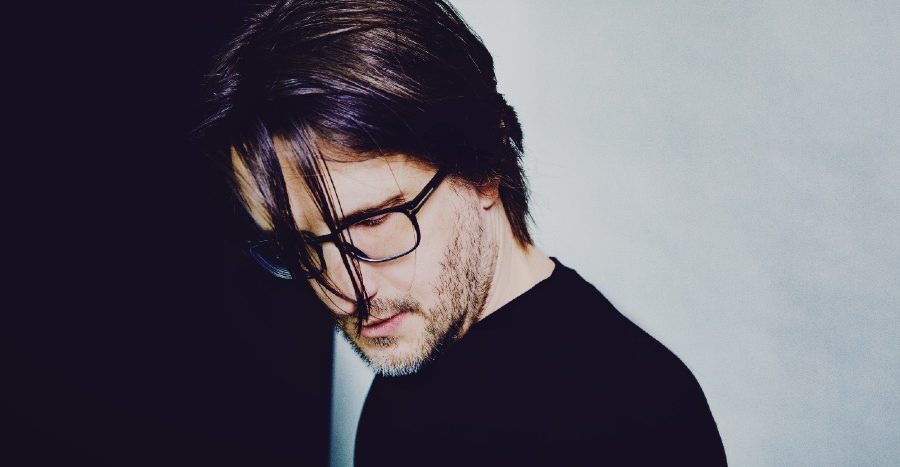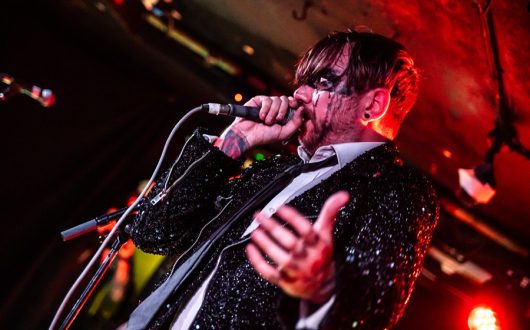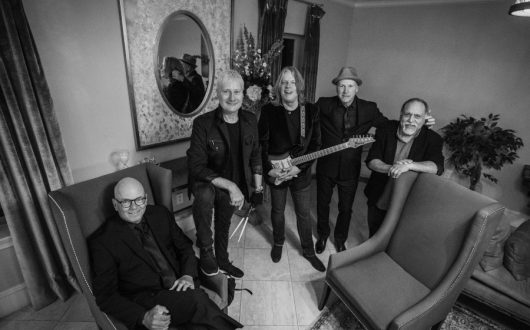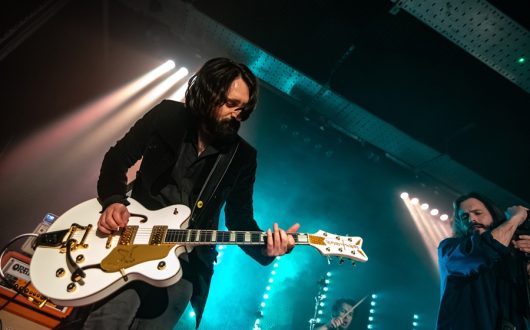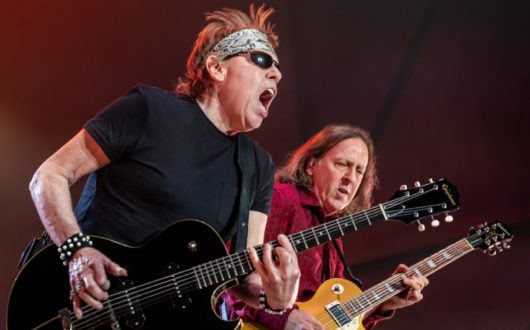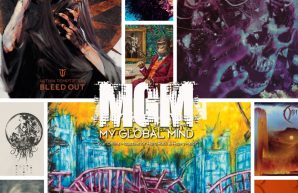Interview by Mark Lacey
Photo Credit: Hajo Mueller
“There’s no doubt that in the 21st century, we live in the electronic age. All the sounds we hear, the sounds that come from our phones, our laptops, the sounds that we hear when we go into a clothes store, whatever it is these days, it will tend to be electronic. Whereas rock music soundtracked the second half of the 20th century, there’s no doubt in my mind that electronic music soundtracks the 21st century”.
Steven Wilson has built a reputation as one of the music industry’s greatest innovators; his latest work always challenging, but ultimately winning over, and mesmerising his increasing legion of fans; a result of his uncompromising ambition, and a refusal to stand still. His latest album ‘the Harmony Codex’ is extraordinary, and quite possibly his finest work to date, but it will also be seen by some as his most polarising, as he embraces a wholly more electronic and ambient persona. Expect the unexpected. It is however, epic, conceptual, thought provoking, and unequivocally Steven Wilson.

Photo Credit: Hajo Mueller
MGM: A few years ago, you described your career as being a bit of a noble failure. Your music’s really inspired so many people, and many musicians will be deeply envious of the success you’ve had. Do you still feel that way?
SW: Obviously, I was saying that slightly tongue in cheek. What I meant by that is that my career hasn’t ended up anything like I intended it to. In that sense, it’s a failure. But nothing you do ever really comes out the way you intend it to. I still think that’s true, even with the new record. I’m incredibly proud of it, but it’s not quite the way I heard it in my head. There’s a truism there that nothing will ever be, or can ever be, the way you hear it in your head. But broadly speaking, I’m not really where I intended to be in my career. That’s not to say I’m not very happy, because I am. I have a career where I pretty much do what I want, and every time I make a record, it’s different to the way it was before and I somehow get away with it, and still have my fan base. I don’t underestimate how privileged I am to be in a position where I can essentially be very self-indulgent, and very selfish with the way I make music and still maintain a fan base. We’re all living through a very different period of time in the music industry. I fell in love with this idea that you could make uncompromising album orientated music and still sell millions of copies of your records and still be a rock star, and actually that’s not possible anymore. We live in the age of social media, and short attention spans. People don’t really engage with music in the sense of an album. They engage with music in playlists and streaming and individual songs. So, the whole notion that I fell in love with doesn’t really exist, at least in the mainstream. Therefore, failure was almost guaranteed.
MGM: When you think about where you wanted your career to be, what did you hope it would look like?
SW: I wanted to make my ‘Dark Side of the Moon’, have that amount of success and that amount of listener engagement. It was possible in 1973, just about, but it’s not possible anymore. I would love ‘The Harmony Codex’ to reach a very big audience because it’s not difficult music. It’s sophisticated, but it’s not difficult in the sense there are melodies, and there are songs. If it had been released in the 70s / 80s or even the 90s, when Radiohead released ‘OK Computer’, it was still possible to find a very big audience making relatively uncompromising, album orientated rock music. And in the 21st century, it just isn’t.
MGM: You’re known to be uncompromising in your music. You’ve morphed your direction slightly in the last couple of years, since ‘To the Bone’. ‘The Future Bites’ went further and now this album ‘Harmony Codex’ goes even further still, but there’s still a very recognisable Steven Wilson sound in there. Was this a deliberate path?
SW: Obviously, the answer to that is yes. I don’t do anything without some sense of intent. My whole philosophy has always been, I’ve done that, why would I do it again? Let’s do something different, because to me it’s boring to just go and do the same thing again. But I also recognise that sometimes that’s exactly what the listeners would like. There are plenty of bands out there that will just give more of the same; most artists do, to be fair, and I’m not trying to come at that from a holier than thou point of view. Some artists hone a similar approach across a whole career and their fans know what they’re going to get each time; what I call the AC/DC syndrome. I love AC/DC, but they do essentially plough the same furrow, and have been for 50 years.
My philosophy was always more akin with the people I grew up admiring, like Bowie, Prince, Zappa, Peter Gabriel, Kate Bush, Pink Floyd, and not knowing what they were going to do next. Part of that contract is acknowledging that you will always disappoint some of your listeners, but then I could argue that you would disappoint your listeners if you keep doing the same thing, too. It’s the law of diminishing return. One of the things the really loyal fans understand now is to expect the unexpected and to be open minded about what I might do. Over the last ten years, I’ve fallen out of love very much with guitars, so the music reflects that. It’s become more electronic, sonically more experimental, as my interest in guitars has faded. It’s not to say there aren’t still a lot of guitars on this new record and guitar solos, but it’s become less prevalent in the music. The peak would have been something like ‘In Absentia’ or even ‘Hand Cannot Erase’. That was an album which was very much still in the tradition of 70s classic rock, and that’s become less interesting to me. An artist, if I can pretentiously refer to myself as that, is bound to acknowledge the times they’re living in. There’s no doubt that in the 21st century, we live in the electronic age. All the sounds we hear, the sounds that come from our phones, our laptops, the sounds that we hear when we go into a clothes store, whatever it is these days, it will tend to be electronic. Whereas rock music soundtracked the second half of the 20th century, there’s no doubt in my mind that electronic music soundtracks the 21st century. Even at my age, I feel like it would almost be a disservice if I didn’t acknowledge that. I’m also fascinated by that and I love electronic music. Part of the fanbase will always decry the fact that I’ve moved away from guitar music to more electronic music. But that’s not to say the new album isn’t just as conceptual and just as epic and just as uncompromising.
MGM: Harmony Codex is your third consecutive album to have achieved a top four chart position. Does that chart validation resonate with you? Have you at last achieved mainstream acceptance?
SW: To be mainstream these days, without stating the obvious, you have to be very visible within the mainstream. I think I’m the only British artist that consistently has top five albums, that has never been invited onto Later with Jools Holland; a show which is now in its 32nd season. I have a slight chip on my shoulder about that, but I acknowledge it’s partly to do with the progressive rock tradition that I’m perceived to come from, which has always been seen as slightly uncool. Even though there have been periods in time when it’s sold a lot of records, it’s always been perceived as something on the periphery. Now, I think the top five positions across Europe are a reflection of the fact I have a very loyal and sizable fan base. But if you went up to most people in the street, they would still never have heard of me.
So, there’s mainstream and there’s mainstream. I sell a lot of records. My streaming figures are going up, too. I think the difference between an album like ‘Hand Cannot Erase’ and albums like ‘Future Bites’ and ‘Harmony Codex’ is they’re actually reaching people that have no interest in progressive rock and rock music. So, the audience has diversified. A lot of people that buy my records now are not coming at it from ‘he’s a prog rock artist’, and there was a time when I think that was the entirety of my audience was polarised in that area. Progressive rock fans are a very vocal minority, and they shout the loudest when they don’t like what I do. For example, ‘The Future Bites’, which was very pop, was not popular with the progressive rock audience. There were a lot of other people that were liking it and buying it. One of the reasons why I think ‘Harmony Codex’ has been so well received is it seems to be hitting all of those people. The progressive rock fans seem to like it, too, and I think that’s testament to the fact it is, quite ambitious, quite conceptual. There are some long tracks on it, so it has a little doorway that everyone can walk through, perhaps.
MGM: The final chapter in your book is your Harmony Codex short story. Is the album concept a true reflection of the story?
SW: I think it’s more about the ideas in the story. Although the album has a sense of narrative and journey to it, it’s mostly to do with the way the music unfolds. There are some songs on the record which are very specifically about the story, but taking ideas from the last track, Staircase. Some of the other songs take on the characters and some of the scenes and lines in the story are transposed exactly to the music. There are other songs where it’s very vague and very oblique. But the one thing that is consistent about the album, is this idea of the infinite staircase; it’s the journey, not the destination and that’s an analogy for life. Coming right back to this whole thing about being a failure, it’s only in the sense that I failed to become what I thought I would. But actually, I’m really happy with the way my career has gone anyway. So, it’s about embracing the journey and not worrying about whether you’ve arrived at your destination, or you’ve achieved your goals or dreams, because actually very few of us do, but we have an incredible adventure along the way. ‘Time is running out’ is about arriving at this point in my life and taking stock; making some sense of my own life and acknowledging to myself that perhaps I haven’t arrived where I intended to. But you know what? Maybe where I have arrived is even better than where I might have.
MGM: Niko Tsonev is back playing guitar with you on this album. Fans will remember him from playing the second UK leg of the Grace for Drowning tour, but is this the first time he’s recorded a studio album with you?
SW: I think it is. It’s funny, because one of the things I’ve always said that’s nice about being a solo artist is that idea that you’re always the same, but you can change the people around you, and that can almost give the illusion of progress. That was something Bowie was very good at. He was always the same, but he would change the band and he would change the approach. And that’s what I like about being a solo artist and why I felt that was something I wanted to embark on, almost 15 years ago; to be able to work and collaborate with different people. That’s so fun.
MGM: You wrote a song for Grace for Drowning called Index, about cataloguing. You’re sat in a room surrounded by thousands of records. You’ve played with many different musicians as part of your solo work, and you’ve also played most of the venues across the UK. Are you collecting and cataloguing musicians and venues?

Photo Credit: Hajo Mueller
SW: The idea of collecting people is an interesting one, because I do feel part of being an artist is finding people that you trust, and who get you and get what you’re trying to say. Since the beginning of my career, I’ve been very lucky to have a long term, consistent relationship with Adam Holtzman on keyboards and Nick Beggs on bass. I completely trust them and they have been on this journey with me. But at the same time, I’ve had a lot of different guitar players and different drummers. Sometimes that’s not my choice. These guys are busy working musicians. And actually, the same is true of the venues. These days, they’re booked up at least 18 months in advance. It’s funny, because I’m booking my tour now, and a lot of venues are booked up till 2026’. It’s crazy. Post COVID everyone is out there touring. So, it’s not always about what you want. I’ve lost musicians over the years because they’ve gone off and got other gigs and that’s also part of the contract of being a solo artist.
MGM: Many are describing the title track ‘Harmony Codex’ as the highlight of the album. You recently performed it live at the EartH venue with Niko on guitar, and your wife Rotem on narration. What were you trying to achieve with that song?
SW: In musical terms, it’s really trying to create an audio equivalent of this idea of the infinite staircase. Without getting too muso and technical, it’s a cycle of 24 chords that never repeat, but they circle back on each other, so it becomes this very hypnotic piece of music. It’s purely electronic. It’s basically a bunch of analogue synthesizers, all cycling round this cycle of chords and creating this sense of build and decay, the ascent and the descent. It’s the metaphor of the staircase which comes from the original story. It might be my favourite on the record too, partly because it’s something I don’t think I would have been brave enough to put on a record before now, because it’s essentially ten minutes where very little happens. It’s ambient music. In some ways it’s neoclassical music, but it’s very minimal. No guitars, no drums, no lyrics, apart from the recitation that takes place at the beginning and end. I allowed myself to just let this very long piece of music unfold in a very minimal but very beautiful and very transcendent way. The version I did at the Earth show was even longer. It’s one of those pieces that’s almost open ended; it can last forever.
MGM: There are some similarities between ‘Harmony Codex’ and the ambient music you create as Bass Communion.
SW: I haven’t done a lot of Bass Communion music recently, it’s probably ten years since I released a new record. But I’ve got a lot of pieces I’ve been developing over that last ten years or so. I really should put them together on an album at some point. There was always a sense that Bass Communion, on one hand, was something I really enjoyed doing in of itself, but it was also research and development for feeding into other projects, in the sense that it was about sound design; about texture and about ambience. The Harmony Codex is something that feels almost informed by what I do with Bass Communion, because it is allowing itself to just create an atmosphere without worrying too much about being too clever, or having the trappings of rock music involved. I think that’s one of the reasons I’m perhaps most proud of the title track on the record. It’s quite a brave move for me to put that in the middle of essentially what is a conceptual rock album.
MGM: How did it feel to be on stage at EartH without a guitar, and performing behind a series of keyboards and synthesizers?
SW: Well, very odd. It’s one of those things where it was only 30 minutes and I felt like I was just beginning to relax and then it was over. It’s funny because many years ago I was in bands as a keyboard player and then around about 1992, Porcupine Tree began to take off and by default I became the guitar player in that band. I became known as a guitar player and a frontman, and I had to grow into that role. Obviously, with the albums moving further away from the guitar vocabulary and more towards an electronic musical vocabulary, it made sense to make that transition back to the very beginning of my career when I was a keyboard player. I enjoyed it. When I go out on tour to promote the Harmony Codex, I will be playing the guitar too, but you will see me spending a lot more time behind a keyboard workstation. I absolutely love it. But it’s going to take getting used to, for me, as well as the fans.
MGM: The last time that you toured in your solo capacity was 2019. How do you think you’ll approach the set on your new tour, performing music from the more electronic ‘Harmony Codex’ and ‘Future Bites’ albums, whilst still being able to include some of your earlier material.
SW: Everything is always a challenge, but for example, my first solo album ‘Insurgentes’ is probably closer to what I’m doing now, and a piece like ‘Index’ is not a million miles away from Harmony Codex. But a lot of the material from an album like ‘The Raven that refused to sing’, I don’t think would fit so well in that world. I want the show to be a journey, too, and so it will be quite diverse. There will be tracks during the show where I will go back to more of a rock format. I definitely want to play things like ‘Ancestral’ on the tour; I love playing that piece. Like all my records, it’s going to be shaped like a musical journey that goes through different terrains, different scenes, different atmospheres and different emotions. I’ve got a provisional set list already in mind that I think will be very surprising. One of the beautiful things about my career, which I embrace, is I don’t have any hits. And that is liberating because people don’t really have any expectation about a particular song that they expect to hear. I’ve never had to pander to that “greatest hits” jukebox mentality.
MGM: You’ve hinted at the idea of doing residencies rather than doing a conventional tour. What sort of venues might you perform in over the next twelve months?
SW: Without giving too much away, the idea would have been to have done a whole week of shows in a venue like EartH, to be able to do something really intimate and really immersive. However, financially it doesn’t really work because to do a full show, I’d have to employ world class musicians, world class crew, and if you can only sell 600-700 tickets a night, you can’t cover your costs. With the Future Bites tour we were going to do the O2 arena, but I don’t want to do that, because it’s very hard to do what I want to do in terms of the Spatial Audio. And one thing I’m sure about with the tour is I want to have Spatial Audio. I’ve put so much of my heart and soul into being an ambassador for sonic excellence and it’s very hard to do. The bigger the room, the harder it is to create that sense of immersive audio, because you have to have speakers all around the audience and it just gets diluted and lost. I’m looking at doing some theatre type venues, where I think I’ll be able to pull off the spatial audio, but perhaps in slightly bigger rooms; maybe 1500-2000. It’s all being discussed right now. We want to do nice theatres because it’s going to be a long show, and I want people to be able to get lost in it.
MGM: You’ve talked in the past about how your remixing projects have influenced your writing at times. Was Harmony Codex influenced the same way?
SW: With the Harmony Codex, it’s interesting because people have been saying to me, ‘what were your influences?’ and the answer is ‘none’, and that’s unusual for me because usually I have quite a strong agenda with a record. When I was doing ‘The raven that refused to sing’, I wanted to make an old school prog rock record. When I was doing ‘To the Bone’, I wanted to make an 80s art pop record. When I was doing ‘Future Bites’, I wanted to make a very streamlined electronic pop record. This time around, I had no agenda, and I really don’t feel it was influenced by anything, except wanting to do something magical. Maybe cinema was more of an influence because it has this very cinematic scope to it.
MGM: You’re known for having an encyclopaedic knowledge of music, and you’re sat in a room with a lot of records. Do you get time to listen to a lot of music?
SW: I do, but I find I’m always playing catch up because I still buy a lot of records, so I never go back to the old ones. I recently did some record store signings and I ended up bringing back about 20 records and I still haven’t listed to them all. I’m always listening to new things and I’m not going back into my comfort zone. I’m always more excited about hearing new music than I am about maybe going back to the things I know and love. It’s not like I don’t love them, but I feel like I know them.
‘The Harmony Codex’ is out now on Virgin Music
For more information:
www.facebook.com/StevenWilsonHQ
